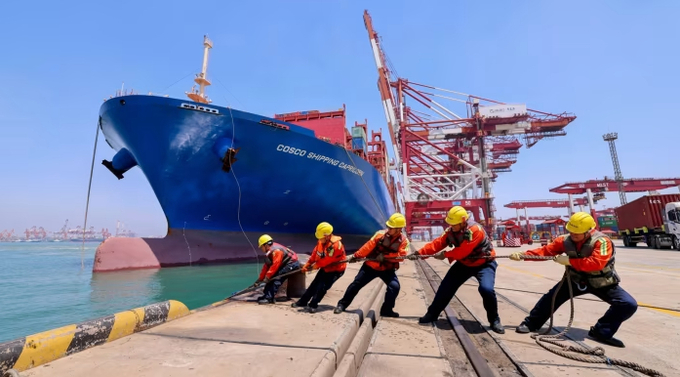May 20, 2025 | 07:44 GMT +7
May 20, 2025 | 07:44 GMT +7
Hotline: 0913.378.918
May 20, 2025 | 07:44 GMT +7
Hotline: 0913.378.918

The EU is China’s second-largest trading partner, but tensions have been rising over Brussels’ accusations that Beijing is fuelling industrial overcapacity to boost disappointing economic growth.
The EU is lobbying China to exclude agriculture from a series of escalating commercial disputes, calling for the “strategic sector” to be protected from trade tensions in the renewable energy and electric vehicle industries.
The bloc has launched several investigations over the past year into Chinese suppliers that it alleges have contravened a new foreign subsidies regulation, which gives Brussels the power to “address distortions” that benefit third country companies operating in the EU.
“My intention is to do everything which is possible to avoid the situation that agriculture is a victim of the problems in other sectors,” EU agriculture commissioner Janusz Wojciechowski said in an interview during a visit to Beijing late last month.
Wojciechowski added that he told “Chinese partners” that “we should treat agriculture as a sector which requires special protection . . . as a strategic sector, strategic for security”.
The EU is China’s second-largest trading partner, but tensions have been rising over Brussels’ accusations that Beijing is fuelling industrial overcapacity to boost disappointing economic growth, raising fears of dumping in European markets.
Brussels has also objected to a growing Chinese goods trade surplus, which stood at €291bn in 2023, down from a record of nearly €400bn a year earlier but well above the levels of the previous decade.
Agrifoods, however, is one area where the EU ran a surplus, Wojciechowski said. The bloc’s agrifood exports to China were worth €14.6bn, down almost 8 per cent from 2022 while imports from China to the EU fell 15 per cent to €8.3bn.
The bloc has launched several anti-subsidy investigations in recent months targeting Chinese companies in the clean energy and infrastructure sectors. In September, European Commission president Ursula von der Leyen announced a probe into Chinese electric vehicles that could result in the introduction of tariffs.
China launched a probe into the cognac market — a top French export — following the announcement of the EV investigation. Beijing has denied that the actions are related but agricultural producers are concerned that an EU crackdown on Chinese subsidised products could draw retaliation from Beijing against EU food exports.
“Our agrifood exports to China are important . . . and it is problematic if our sector pays the price for disputes concerning other sectors,” a spokesperson for the EU agricultural lobby group Copa Cogeca said. Copa Cogeca pointed to the experience of Australia, where agricultural exports to China, previously its biggest export market, have been subjected to sanctions over political disputes.
The trade group said it had “carefully monitored” that situation “in terms of agrifood retaliation”. There are some signs of a softer approach from China towards the EU agrifood sector, however. In January, Beijing lifted a five-year ban on Belgian pork products initially imposed because of swine flu.
Wojciechowski said Chinese officials did not send any signals they would “penalise” agricultural trade during his trip. China’s President Xi Jinping has in the past identified food supply as crucial to national security.
But the volume of EU agrifood exports to China remains far behind 2020-2022 levels, partly due to lower shipments of pork and dairy products, which were affected by higher energy costs.
“There is also space for improvement,” Wojciechowski said of the trade balance, noting that Chinese consumers spent about €10 per head annually on EU agrifood products, just half of the €20 per head spent by Europeans for Chinese agrifood goods.
Xi Jinping was scheduled to begin his first visit to Europe in five years on Sunday, a trip that will take in France, Serbia and Hungary.
(FT)

(VAN) Fourth most important food crop in peril as Latin America and Caribbean suffer from slow-onset climate disaster.

(VAN) Shifting market dynamics and the noise around new legislation has propelled Trouw Nutrition’s research around early life nutrition in poultry. Today, it continues to be a key area of research.

(VAN) India is concerned about its food security and the livelihoods of its farmers if more US food imports are allowed.

(VAN) FAO's Director-General emphasises the need to work together to transform agrifood systems.

(VAN) Europe is facing its worst outbreak of foot-and-mouth since the start of the century.

(VAN) The central authorities, in early April, released a 10-year plan for rural vitalization.

(VAN) Viterra marked a significant milestone in its carbon measurement program in Argentina, called Ígaris, reaching 1 million soybean hectares measured.